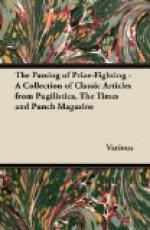When I got into the street an unaccustomed spirit of gaiety at once took possession of me; my general feelings of benevolence and goodwill towards all mankind appeared to have received a sudden and marvellous increase. I seemed to tread on eider-down, and, cigar in mouth, strolled along Fleet-street and the Strand, towards my domicile in Half-Moon street—“nescio quid meditans nugarum”—sometimes humming the fag end of an Irish melody; anon stopping to stare in a print-shop window; and then I would trudge on, chewing the cud of sweet and bitter fancy as I conned over the various ups and downs that had chequered my life since Jack Withers and I were thoughtless lads together “a long time ago.”
In this mood I found myself standing before the New Strand Theatre, my attention having been arrested by the word Punch blazoned in large letters on a play-bill.
“What can this mean?” quoth I to myself. “I know a publication called Punch very well, but I never heard of a performance so named. I’ll go in and see it. Who knows but it may be an avatar[1] of the Editor of that illustrious periodical, who condescends to discard his dread incognito for the nonce, in order to exhibit himself, for one night only, to the eyes and understandings of admiring London.”
[1] The Avatar we do not allow—the
illustrious periodical we
do.—Ed.
Of Punch.
In another minute I was seated in the boxes, and found a crowded audience in full enjoyment of the quiet waggery of Keeley, who was fooling them to the top of their bent, accoutred from top to toe as Mynheer Punch the Great, while his clever little wife—who, by the way, possesses, I think, more of the “vis comica” than any actress of the day—caused sides to shake and eyes to water by her naive and humorous delineation of Mrs. Snozzle.
The curtain had hardly fallen more than a couple of minutes, when a door behind me opened hastily, and a box-keeper thrusting in his head, called out—“Is there a medical man here?” “I am one,” said I, getting up; “anything the matter?” “Come with me then, sir, if you please,” said he; “a severe accident has just happened to Mrs. Keeley; a falling scene has struck her head, sir, and hurt her dreadfully.”
“Good heavens!” said I, much shocked; “I will come immediately.”
I followed the man to the stage door, and was ushered into a dressing-room with several people in it, where, extended on a sofa, lay the unfortunate lady, whom I had but a few minutes before seen full of life and spirits, delighting hundreds with her unrivalled humour and espieglerie,—there she lay, in the same fantastic dress she had worn on the stage, pale as death—a quantity of blood flowing from a fearful wound on her head, and uttering those low quick moans which are indicative of extreme suffering.
Poor little Keeley stood beside the couch, holding her hand; he was still in full fig as Polichinel; and the grotesqueness of his attire contrasted strangely with the anguish depicted on his countenance. As I came forward, he slowly made way for me—looked in my face imploringly, as if to gather from its expression some gleam of hope, and then stood aside, in an attitude of profound dejection.




